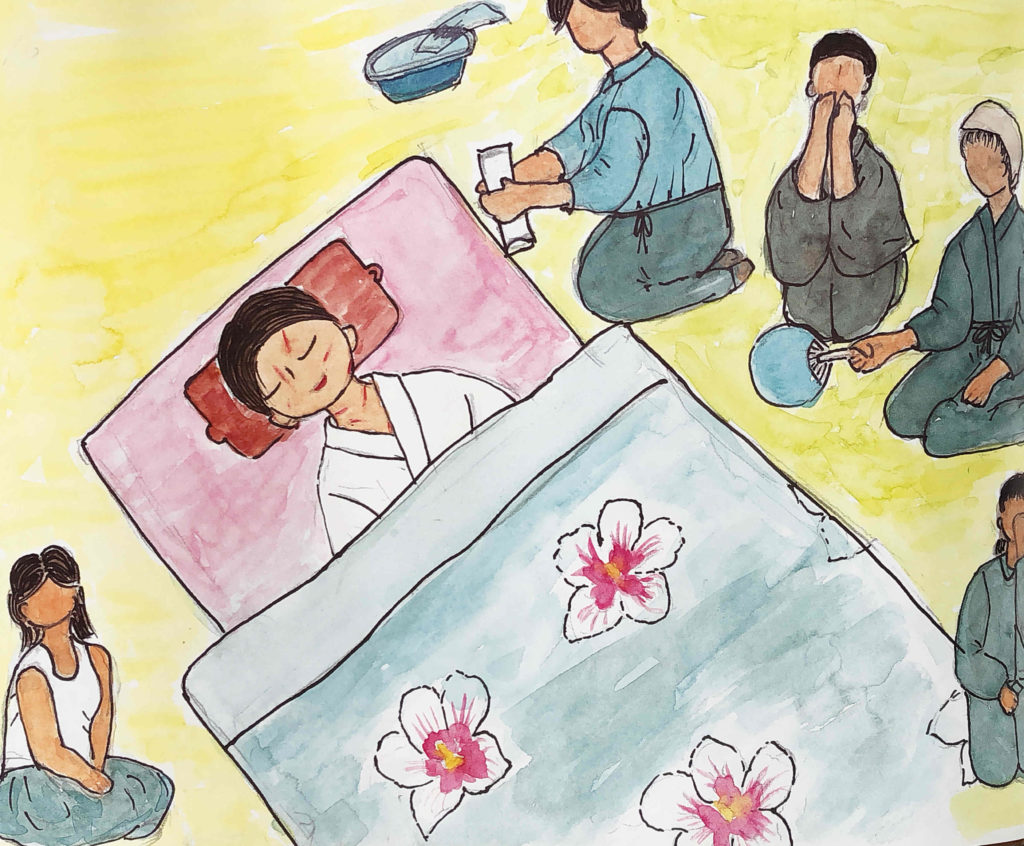Kiyomi Kono
I can’t forget, and we must never forget.
4. After the A-bombing
Three days after the A-bombing, my friend, Fumiko, came back home after one of her relatives found her. She was carried on a door board with her entire body pierced with pieces of glass. Fumiko, who was one year older than me and lived next door, went to a public health nurse training school in Hiroshima. Without doctors or medicine, we could do nothing. A few days later, a lady in the neighborhood called me, and I rushed to Fumiko’s bedside. Although she looked painful with fever, she talked to each one of us sitting there and gave her parting words. She said to her mother, “Mother, I will die soon. Please plant a lot of flowers around my tomb. You are the best mother in Japan.” To her grandmother, “Grandmother, please do not try to put on your wooden clogs hastily. If you do, you will fall down.” To me, “Kiyomi, when you go to school, tell our teachers that I died wishing for the development of our school.” Everyone cried and nodded. She died a few days later.

Several days after I went to the city, I had a rash on my head, face and hands. I was not directly exposed to the radiation, but I had walked around the center of the city the day after the A-bombing, and I might have been exposed to the residual radiation at that time. However, nobody knew that the bomb which was dropped on Hiroshima was an atomic bomb, or that the radiation it produced could cause various diseases. As hospitals in Hiroshima were mostly all destroyed, my father took me to a hospital in Miyoshi by train, worrying about my rash. There, I was told that I was suffering from malnutrition. They shaved my head, applied white zinc oxide oil and wound a bandage around my head. I remember when I started to go to school again, I was embarrassed because I commuted to school by train with my bandaged head. At school, nobody approached me, feeling uneasy about my appearance. The symptoms lasted about one year. My mother often fell down because of anemia. Sometimes, she fell from steps when she felt dizzy. Other than that, she had no aftereffects serious enough to go to see a doctor. However, she was very patient, so we didn’t know whether she was actually all right. She died of gastric cancer at 63.
In those days, there was only one light bulb in my house and no streetlights in my area. When we turned off the bulb, it became pitch dark. I imagined bodies were lined up on the tatami mats in the dark room, and I was really afraid of the arrival of night. Remembering the smell and the scene, I sometimes ran out of the house. That condition lasted a few months.
On August 15, some villagers came to my house, and we listened to the radio broadcast of the Emperor’s announcement of Japan’s surrender together. One man said, “We have to cut girls’ hair short and hide them in the mountains.” I didn’t understand him at that time, but now I can imagine that he thought that when Japan was occupied, its people would experience what Japan Army did to its colonies. When I heard that the war was over, I was just happy that a new era would begin.
About ten days later, villagers pulled a hand cart to the military provisions supply depot in Ujina, because they heard they might be able to get some salt there. Salt was rationed during the war, but the ration stopped when the war was over. Without salt, villagers could not pickle vegetables. There was no food in the depot, but burned salt was piled up. They came back with their cart loaded with a lot of salt, but the vegetables pickled with the salt smelled burned.